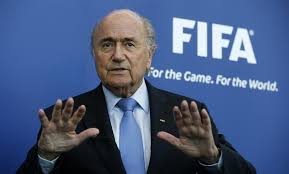By Andrew Warshaw
November 11 – FIFA president Sepp Blatter has ruled out the Qatar 2022 World Cup being moved to January and February because of a potential clash with the Winter Olympics, severely narrowing down the options to switch the tournament from summer. FIFA recently set up a working group to look into alternative dates for 2022 with all the stakeholders involved – medical experts, broadcasters, sponsors, leagues and clubs.
Blatter rules out January World Cup and says progress is being made on labour laws

